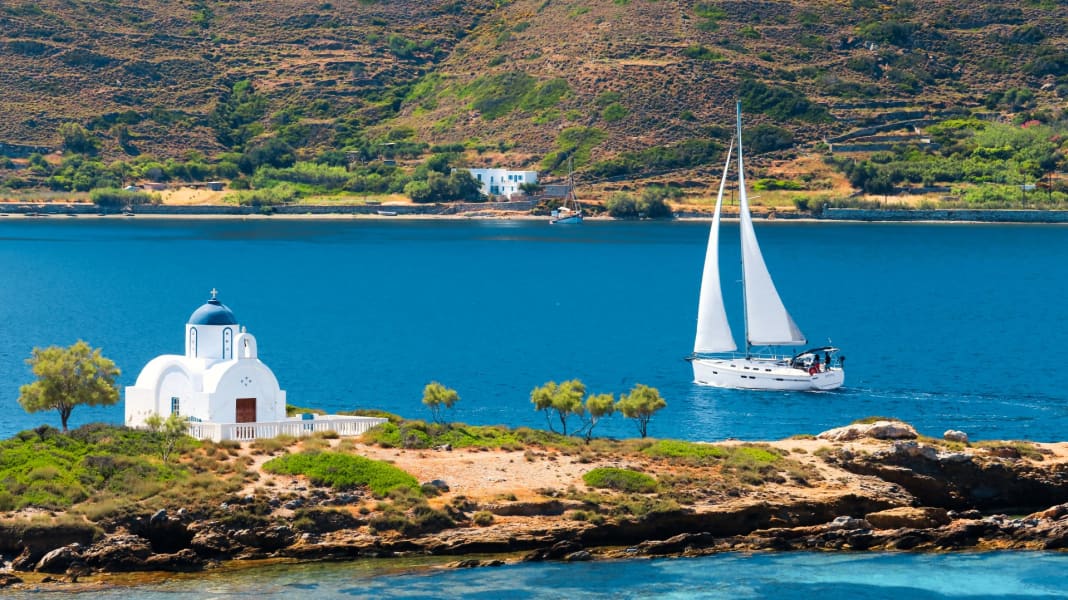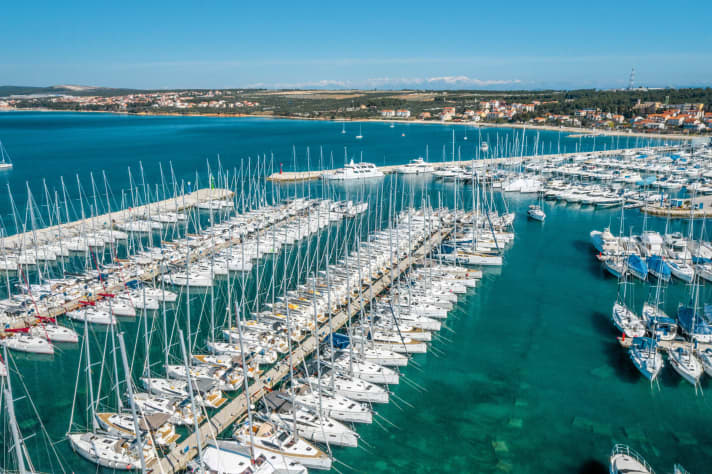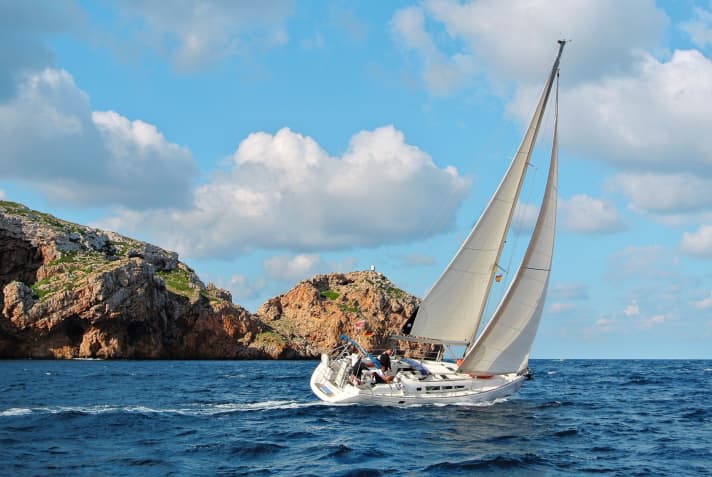
North Sea and Baltic sailors know a thing or two about this: Just a few years ago, permanent berths were readily available. They are now rare and expensive, and the waiting lists are long; we have reported on this several times. Even if it is only a small consolation for local sailors: The situation in the Mediterranean is even more critical.
Full marinas in the south? That was also unheard of there in the past. At best, more upmarket destinations such as the Costa Smeralda or the Côte d'Azur boasted fully booked harbours. Apart from that, there were only a few hotspots, such as central Croatia, Elba and the Balearic Islands, which have always been crowded in summer. Almost everywhere else, on the other hand, it was quite easy to go sailing. However, the coronavirus pandemic and the war in Ukraine have changed things in many places in the Mediterranean.
What can owners and charter sailors expect this year? YACHT author Thomas Käsbohrer asked around.
Croatia
Our journey begins in the north of the country, more precisely in the south-west of the island of Krk. This is where Marina Punat is located - one of the largest in Croatia according to current occupancy figures. Renata Marevic has been running it for many years. Does she still have free capacity on her 1,350 water and land berths? The manager says no: "We are full!" The harbour is mainly used by owner-operated ships, with an area for charter ships in the northern part. "We clearly benefit from our location - from the fact that we are an island marina and that we can be reached quickly and flexibly by car from southern Germany thanks to the bridge to the mainland," adds Marevic. "Our guests come almost exclusively from Germany, Austria and Slovenia."
Despite full occupancy, she also emphasises that there are naturally better chances of finding a berth for the year in large marinas. There is more movement than in small harbours, and a berth can always become available spontaneously. According to Marina Punat, it has moderately increased its prices this year - another indication of good capacity utilisation.
The ACI marinas operated by a large company are particularly well known in Croatia. There are 23 of them along the coast. However, with an average of 250 berths, they tend to be smaller to medium-sized facilities, most of which date back to the 1980s, the early years of nautical tourism on the Adriatic.
The largest ACI marina with 475 berths is located in Croatia's northernmost harbour, Umag. The harbour has been relaxed about the number of free permanent berths for years. "We always have something free," they say. "Anyone who comes to us as a new annual berth holder also receives a 15 per cent welcome discount."
This offer, which also applies to the ACI marinas in Pula and five island marinas on Cres, Rab (Supetarska Draga), Brac (in Milna and Vrboska) and Korcula, is extremely favourable for the first year. The newest ACI marina, Rovinj, also still has free annual berths, but only for yachts up to twelve metres long - and then again only from 28 metres in length and at prices that are intended to appeal to a more affluent clientele.
The further south you sail along the coast, the more often you will sail into harbours that are home to large charter fleets. Zadar, Biograd and above all the region around Trogir and Split are among them. The high number of rental yachts there not only drastically reduces the number of guest berths, but also the available annual berths.

"The more charters, the more crowded" is the simple rule of thumb for finding a berth on Croatia's 280 nautical miles of coastline. This is confirmed by Karl-Heinz Beständig, author and publisher of the well-known Croatia harbour handbook. He says: "With a few exceptions, there is space in the north. From Zadar and further south, the number of free annual berths decreases."
Beständig has also observed another trend in the charter sector: "The increase in the number of catamarans for hire in Biograd or Murter means that there is hardly anything left in charter marinas." Nevertheless, the Croatia expert has a tip for owners: "If you are looking for a place for your boat, you shouldn't be put off with waiting lists, but simply keep asking. Whoever comes, gets it!"
Italy
If you can't find a place for your boat in Croatia, you can look around the neighbouring countries. In Slovenia and on the Italian northern Adriatic coast, for example, there is a not inconsiderable number of permanent moorings that are not too far away from the actual desired area - and which also have their own beautiful sailing destinations.
Between Lignano and Trieste, 20 marinas manage around 7,000 moorings. They are easy to reach by car, especially from southern Germany. Although the harbours are getting crowded there too, "Since the outbreak of the coronavirus pandemic, we have seen an increase in demand for annual berths, but we still have some space," says Fortunato Moratto. He manages the Marina Sant'Andrea in San Giorgio di Nogaro in Friuli.
Some smaller marinas such as Grado or Portopiccolo are traditionally full, says the marina manager, as is the city marina Porto San Rocco just outside Trieste. Nevertheless, Moratto does not recognise a real lack of berths in his region. This is also supported by the fact that prices for 2022 on the northern Adriatic have remained constant in many places, according to him.
The situation is very different on the Italian west coast. There is a real shortage of moorings in the Tyrrhenian Sea. From San Remo near the Côte d'Azur down to Reggio Calabria at the tip of the boot, it is currently not easy to find a berth for an owner's boat. This is particularly true for the areas around Elba and northern Sardinia.
Balearic Islands
The mooring situation on the Spanish Mediterranean islands has also been tense for a long time and there is no improvement in sight. With 30 marinas along its 300 nautical miles of coastline, Mallorca has an astonishing density of harbours, but annual berths have been scarce for years. The shortage is driving up prices.

For many Mallorca sailors, it has therefore long been customary to rent a permanent berth in one of the harbours on the Spanish mainland. Most locals who plan their sailing holiday for July and August on the Balearic Islands often book a guest berth on Mallorca for several weeks in January. After their sailing holiday in the Balearic archipelago, they return to the coast with their boat. A model that could also be of interest to one or two German-speaking Mallorca fans.
Greece
The situation is currently changing rapidly in the areas from the Ionian Sea to the Aegean. Klaus Pitter from Pitter-Yachtcharter explains: "In recent years, Greece has launched enormous support programmes to build up its charter fleets and will return as a top destination this summer. "But," says Pitter, "the typical Greek yachtsman may not find his sailing area as he used to know it." The high number of new charter ships will have a noticeable impact, at the expense of free permanent berths.
Take western Greece, for example: none of the 1,200 water berths and 500 land berths in Corfu's Gouvia Marina, located close to the capital, are available on request for the autumn. Only one berth in Marina Lefkas with its 680 water berths is available for boats around twelve metres in length.
The picture is similar in the large marinas around Athens such as Alimou or Athens Marina, the former Marina Falirou. Hardly any of them can promise a berth. Mikhalis Farsaris, marina operator on Crete, describes the development as follows: "Not only the large harbours, but even more remote marinas such as those on Chios or Rhodes are well booked. Even on Crete, away from the classic charter areas, we are working with a waiting list." For the summer, Farsaris expects that additional floating jetties will have to be anchored in front of many marinas or popular locations on the islands in order to accommodate the large number of boats.
So it's not easy to find a place for the boat in the south at the moment. The hope remains that the situation will ease when both the coronavirus pandemic and the consequences of the war in Ukraine can hopefully be overcome in the not too distant future.
The article by Thomas Käsbohrer is published in YACHT 9/2022 published.

